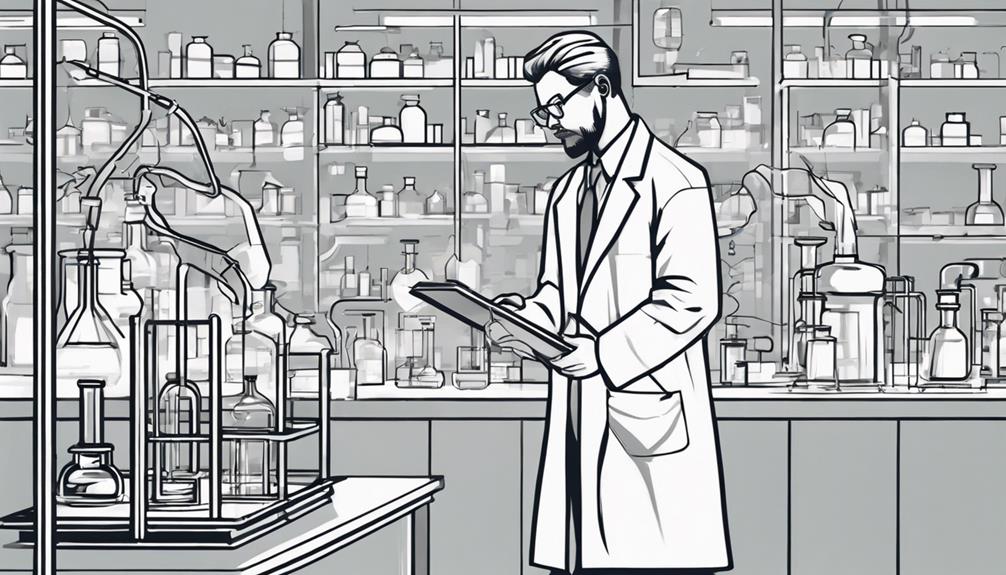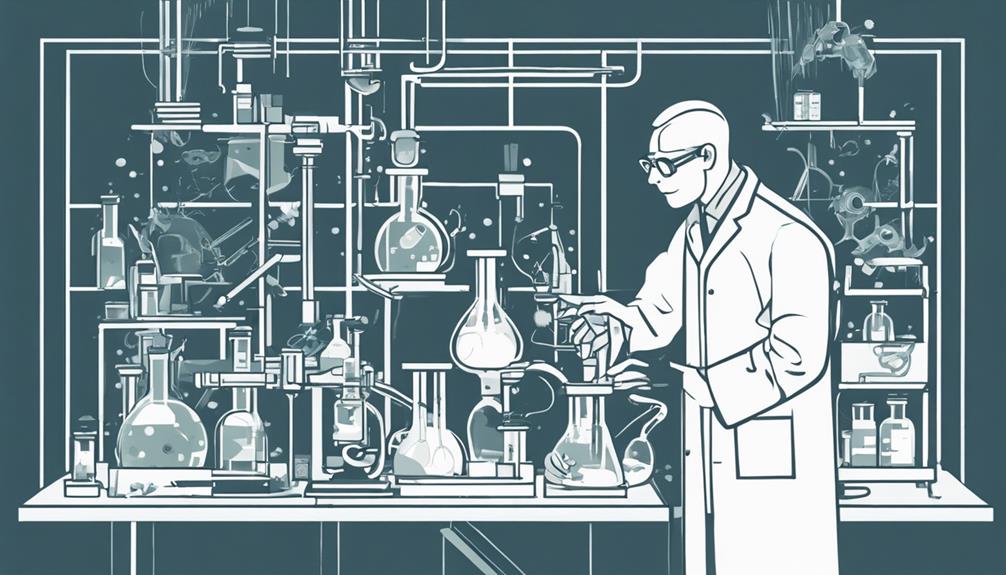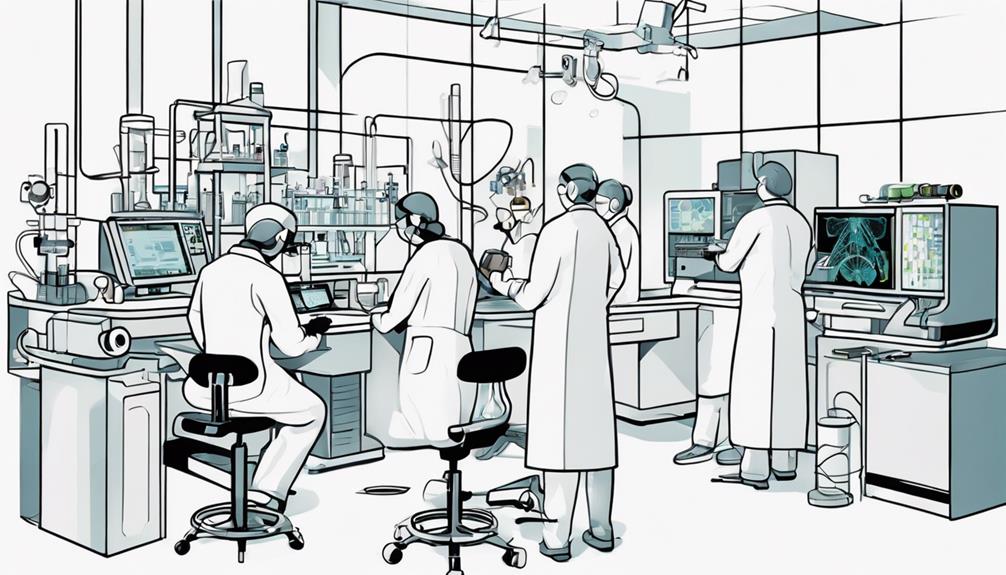The ethical implications of animal testing have long been a subject of debate within the scientific community and society at large. As advancements in technology and alternative methods continue to evolve, the question of whether animal testing is ethically acceptable remains a pivotal point of contention. While some argue for the necessity of using animals in research to advance medical knowledge and save human lives, others question the ethical justifications for causing harm to sentient beings. This discussion delves into the complexities of balancing scientific progress with moral considerations, shedding light on the intricate web of ethics, regulations, and societal values that underpin the practice of animal testing.
Key Takeaways
- Ethical considerations are central in balancing scientific progress with animal welfare.
- Stricter regulations and guidelines ensure animal welfare in research practices.
- Development of ethical alternatives is crucial for advancing research responsibly.
- Public awareness influences perceptions of the ethical acceptability of animal testing.
Ethical Considerations in Animal Testing

Ethical deliberations surrounding animal testing in scientific research necessitate a meticulous evaluation of the ethical implications of balancing scientific advancement with the welfare of animals involved. The concept of animal welfare is central to discussions on ethical animal research, where the moral status of animals is carefully considered. Key ethical issues revolve around the ethical frameworks and guidelines set to regulate animal testing practices, ensuring that procedures are conducted with respect for the animals' well-being and minimizing animal suffering.
The implementation of the 'three Rs' principle – Replacement, Reduction, Refinement – underscores the ethical considerations in animal testing, striving to replace animal models with alternative methods, reduce the number of animals used, and refine procedures to minimize harm. While animal testing has contributed significantly to medical breakthroughs benefiting humans, maintaining ethical standards and promoting public awareness and transparency remain imperative in addressing the ethical challenges associated with animal research. It is essential to navigate these complexities thoughtfully to uphold ethical standards while advancing scientific knowledge.
Arguments Against Animal Experimentation
The ongoing debate over animal experimentation is fueled by compelling arguments that challenge the ethical foundations and scientific validity of using animals in research. Critics of animal experimentation raise significant concerns regarding the ethical implications of causing pain and suffering to sentient beings in the name of scientific advancement. One of the key arguments against animal experimentation is the question of whether the benefits derived from such practices truly outweigh the harm inflicted on animals. Moreover, the validity of research outcomes obtained from animal models is often called into question, as these models may not consistently mirror human responses to drugs and diseases.
Ethical considerations surrounding the moral status of animals and the lack of consent from research subjects further contribute to the opposition against animal testing. Activists and ethicists advocate for the exploration and implementation of alternative methods that can replace animal testing while upholding ethical standards. The push for more humane research practices underscores a growing sentiment that questions the ethical acceptability of continuing traditional animal experimentation practices.
Arguments for Animal Experimentation

Utilizing animal models in scientific research remains a contentious practice, fiercely defended by proponents who argue for its indispensable role in advancing medical knowledge and addressing complex health challenges.
Key Arguments for Animal Experimentation:
- Advancement of Medical Knowledge: Animal experimentation has significantly contributed to major scientific breakthroughs, including the development of vaccines, surgical techniques, and treatments for various diseases. These advancements have played a crucial role in improving human health outcomes and saving lives.
- Insights into Human Health: Animal models provide valuable insights into complex biological processes and disease mechanisms that are essential for understanding human health and developing effective treatments. By studying these processes in animals, researchers can better grasp the intricacies of human physiology and pathology.
- Balancing Scientific Progress with Ethics: Proponents of animal research emphasize the importance of striking a balance between scientific progress and ethical considerations to meet societal health needs effectively. They argue that stringent regulations and guidelines are in place to ensure the welfare and humane treatment of animals in research settings while pursuing critical medical advancements.
Impact on Animal Welfare
Animal testing raises significant concerns regarding the suffering experienced by animals used in experiments, prompting ethical debates on the necessity and implications of such practices. The development of ethical alternatives to animal testing is a focal point in addressing these welfare issues and advancing scientific research responsibly. Striking a balance between scientific progress and ethical considerations is imperative in ensuring the well-being of animals involved in testing procedures.
Animal Suffering Concerns
Considering the ethical implications of subjecting living organisms to experimental procedures, the potential for animal suffering in scientific research remains a contentious issue.
Key Points:
- Animals involved in testing may experience pain, distress, and discomfort.
- Research animals can suffer physical harm, psychological stress, and confinement.
- Ethical debates revolve around balancing scientific progress with minimizing harm to animals.
The ethical acceptability of animal testing is often challenged due to its impact on the welfare of animals used in experiments. As advancements in research continue, finding ways to uphold the welfare of animals while progressing in scientific discoveries remains a critical concern that necessitates ongoing evaluation and discussion.
Ethical Alternatives Development
The advancement of ethical alternatives in research methodologies not only demonstrates a progressive approach but also underscores a pivotal commitment to enhancing animal welfare standards. Techniques such as in vitro methods, computer simulations, and 3D organ-on-a-chip technology offer viable substitutes to traditional animal testing, reducing the reliance on animal subjects while promoting animal welfare. Non-animal testing advancements like the Ames test and microdosing studies prioritize minimizing harm to animals in research practices. Additionally, innovations such as cell-culture based tests and cryopreservation techniques not only refine research methods but also contribute to improving animal welfare outcomes. The development and adoption of validated non-animal testing methods reflect a dedication to ethical alternatives, aiming to enhance research efficacy while minimizing harm to animals and aligning with considerations for animal welfare.
Legislation and Ethics in Animal Testing

Legislation governing animal testing plays a crucial role in establishing the ethical boundaries within which research is conducted. Moral considerations in testing are shaped by the legal framework that dictates permissible practices and safeguards animal welfare. Ethical guidelines for research provide a structured approach to balancing scientific advancement with animal protection.
Laws on Animal Testing
An essential component of ethical research in the field of animal testing involves adherence to established standards and regulations governing the use of animals in scientific procedures.
Key Points:
- The Animals (Scientific Procedures) Act 1986 in the UK sets ethical standards and regulations for animal research.
- Institutional review boards oversee and approve research proposals involving animal testing to ensure compliance with ethical guidelines.
- Public awareness of existing regulations on animal testing influences attitudes towards the ethical aspects of research.
These laws, along with mechanisms like the Freedom of Information Act and the UK Independent Inquiries into Animal Research, play crucial roles in promoting ethical practices and facilitating constructive debates on the ethics of animal testing.
Moral Considerations in Testing
Ethical considerations in animal testing encompass a complex interplay between legislative frameworks and moral obligations towards the humane treatment of research subjects. Balancing scientific progress with ethical standards is crucial in ensuring the welfare of animals used in testing. Guidelines and regulations play a key role in upholding ethical standards, with institutional review boards overseeing the ethical review process. Public awareness of these regulations also influences perceptions of the ethical acceptability of animal testing. The table below provides a summary of the main components shaping the moral considerations in animal testing:
| Components | Description | Importance |
|---|---|---|
| Legislative Frameworks | Laws like the Animals (Scientific Procedures) Act 1986 set ethical standards | Ensures legal compliance |
| Ethical Standards | Guidelines balancing scientific goals with humane treatment | Defines ethical boundaries |
| Institutional Review Boards | Oversight to monitor and enforce ethical standards in research | Ensures ethical compliance |
Ethical Guidelines for Research
In the realm of animal testing, the adherence to established guidelines and principles governing research practices is paramount for ensuring the ethical treatment of research subjects and upholding scientific integrity.
Key Points:
- The Animals (Scientific Procedures) Act 1986 in the UK sets ethical standards and regulations for animal research.
- Institutional review boards and ethical review processes ensure compliance with humane treatment guidelines in animal testing.
- Public awareness of existing regulations influences attitudes towards animal research practices.
These guidelines not only promote transparency through mechanisms like the Freedom of Information Act but also encourage the development and implementation of alternative techniques by organizations like the National Centre for the Replacement, Refinement, and Reduction of Animals in Research (NC3Rs), aiming to reduce the necessity of animal experimentation.
Alternatives to Animal Experimentation

Advancements in scientific research have led to the development of various alternatives to animal experimentation, including in vitro methods, computer simulations, and human cell cultures. The National Centre for the Replacement, Refinement, and Reduction of Animals in Research (NC3Rs) plays a crucial role in promoting the use of these alternatives. Non-animal testing options such as microdosing studies and 3D organ-on-a-chip technology are gaining prominence in the scientific community. Techniques like the Ames test and in vitro tests are employed for pre-screening compounds before resorting to animal testing, contributing to the Reduction and Refinement principles.
Human cell cultures offer a valuable tool for studying the effects of substances on biological systems without the need for animal experimentation. The hollow-fibre system and brain cooling methods are examples of innovative approaches that help reduce the reliance on laboratory animals for various research studies. Embracing these alternatives not only addresses ethical concerns but also reflects the scientific community's commitment to advancing research practices towards more humane and effective methodologies.
Frequently Asked Questions
Is It Ethically Correct to Test on Animals?
When considering the ethical question of testing on animals, various factors such as ethical considerations, alternative methods, animal welfare, scientific validity, public opinion, regulatory oversight, moral implications, environmental impact, legal framework, and industry standards need to be carefully examined. It is essential to weigh the benefits of scientific advancements against the potential harm to sentient beings and adhere to ethical guidelines to ensure responsible and humane treatment of animals in research practices.
Can Animal Testing Be Humane?
Animal testing can be humane when strict ethical guidelines are followed, focusing on animal welfare, pain management, and alternative methods. By incorporating scientific validity, genetic modification, and considering species differences, researchers aim to minimize harm and ensure long-term effects are assessed. Regulatory oversight and public perception play crucial roles in shaping practices, emphasizing the importance of continuous monitoring and improvement in promoting ethical and humane treatment of research animals.
Is Animal Testing Ever Justified?
Animal testing may be justified within the ethical boundaries of scientific necessity, exploring alternative methods to minimize animal usage while considering moral implications. Public opinion, regulatory oversight, and adherence to industry standards further shape the debate. Balancing animal welfare with research benefits creates moral dilemmas that necessitate careful consideration. Striving to optimize the three Rs principle guides the ethical justification of animal testing, acknowledging the complexities and controversies surrounding this practice.
Is It Acceptable to Use Animals for Experiments and Research?
When considering the use of animals for experiments and research, it is essential to evaluate the scientific validity of alternative methods, public opinion on animal welfare, and adherence to legal regulations and industry standards. Balancing ethical considerations with the potential for medical advancements and the environmental impact of research practices is crucial. Additionally, research funding plays a significant role in determining the feasibility and necessity of utilizing animals in scientific studies.
Conclusion
In conclusion, while animal testing raises complex ethical considerations, the potential benefits of scientific advancements must be weighed against the moral implications of animal suffering. One may argue that the use of animals in research is necessary for the advancement of medical knowledge and the development of life-saving treatments. However, it is crucial to acknowledge the ethical concerns surrounding the treatment of sentient beings and strive towards alternative methods that minimize harm and prioritize animal welfare.
